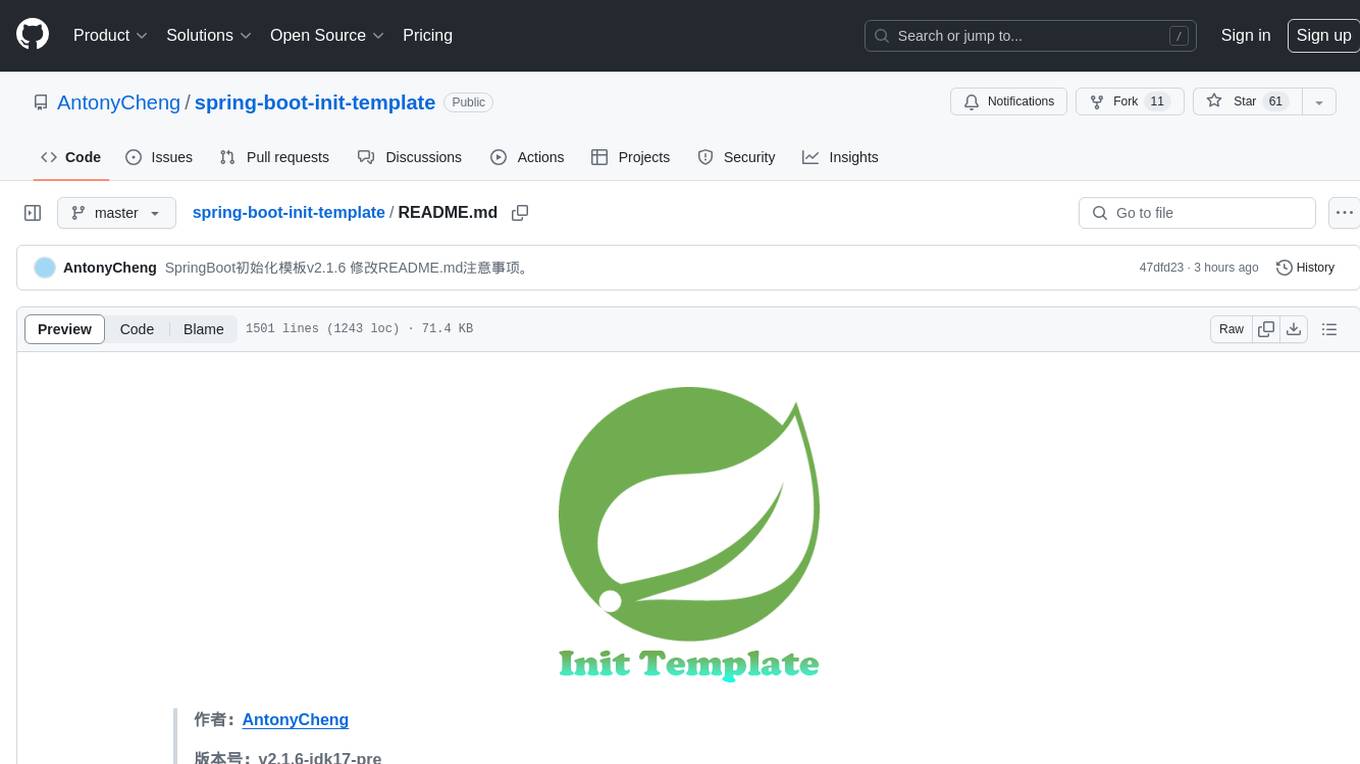
unity-AI-Chat-Toolkit
使用unity实现AI聊天相关功能。目前这个库包含了对chatgpt、chatglm等大语言模型的api调用的代码实现以及实现了微软Azure以及百度AI的语音服务功能,语音服务均采用web api实现,支持Windows/WebGL/Android等平台
Stars: 536
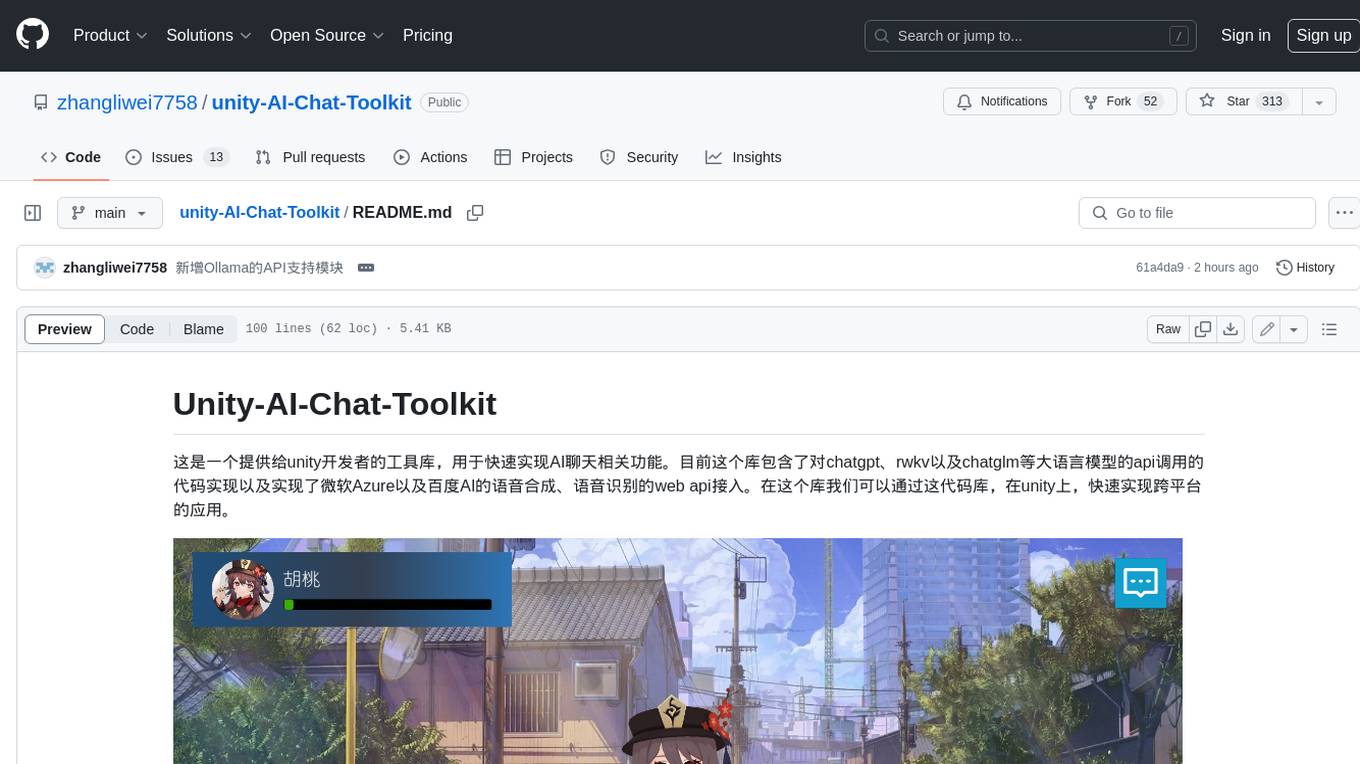
The Unity-AI-Chat-Toolkit is a toolset for Unity developers to quickly implement AI chat-related functions. Currently, this library includes code implementations for API calls to large language models such as ChatGPT, RKV, and ChatGLM, as well as web API access to Microsoft Azure and Baidu AI for speech synthesis and speech recognition. With this library, we can quickly implement cross-platform applications on Unity.
README:
这是一个提供给unity开发者的工具库,用于快速实现AI聊天相关功能。目前这个库包含了对chatgpt、rwkv以及chatglm等大语言模型的api调用的代码实现以及实现了微软Azure以及百度AI的语音合成、语音识别的web api接入。在这个库我们可以通过这代码库,在unity上,快速实现跨平台的应用。
要求unity2020.3.44及以上版本
这个工具是根据我之前的AI二次元小姐姐项目整合后的工具包,目前是整合了通用模块,把相关模型包括Vroid以及live2d模型全部删除了,如果需要使用老版本资源的话,文档后面我会放上传送门,自行下载就可以了。
目前这个工具,主要模块包括LLM以及TTS&&STT两个模块:
=====================
实现的就是针对不同的大语言模型的api调用的代码实现。目前已经实现的大语言模型包括:
集成了chatgpt 3.5/4 的api接口,使用这个脚本,需要在脚本参数里填写openai的api key, 默认设置的模型是chatgpt-3.5,如果要替换chatgpt4,需要自行修改模型名称;
集成了对chatglm官方示例的api接口,如果使用chatglm官方的仓库部署的api服务,就可以直接使用,需要配置的内容是,配置部署好的api地址即可;
集成了针对rwkv runner开源项目的api接口,因为rwkv runner这个项目的api格式和chatgpt是一样的,如果下载rwkv runner这个项目使用的话,可以使用工具提供的脚本,只需要在api地址参数配置实际的地址就可以了。
集成了科大讯飞的星火大模型的api对接功能,可根据需求自行配置V1.5/V2.0版本
集成了百度智能云千帆大模型平台模型api服务,包括文心一言等十种模型
集成了智谱AI开放平台下,chatGLM Turbo模型的api支持
集成对Ollama部署的本地大模型的API调用支持,可以利用chatOllama模块驱动AI小姐姐聊天
集成对DeepSeek的API调用支持
=====================
这个模块实现了对语言模型反馈信息的语音合成功能的代码实现,以及发送信息时,可能用到的语音识别服务相关的代码实现。目前已实现的语音产品包括:
如果使用这个服务,需要准备微软Azure的语音服务令牌,自行注册账号,开通服务获得;
使用这个服务时,注册百度AI开放平台的账号,开通语音合成、语音识别服务,创建应用获取到相关的密钥,填入相应脚本即可。
集成了openAI平台的Whisper在线语音识别api,需要使用openai的api key 集成了openAI平台的TTS语音合成api,可实现语音合成功能
集成的项目是github上开源项目:https://github.com/ahmetoner/whisper-asr-webservice 部署这个项目,可使用本模块来调用语音识别的api
实现了对科大讯飞语音服务的api集成,采用了websocket方式,可使用科大讯飞的语音识别以及语音合成服务
=====================
这个模块实现了关键词语音唤醒相关的功能,能够通过实时监听关键词,进行对话功能的唤醒
使用了windows.speech库,实现的关键词识别功能,支持在windows平台下的语音唤醒功能
=====================
使用了Oculus的Lipsync方案,并集成到了项目包里,可以使用本方案实现windows平台的音频转口型的效果。 完整的插件地址,可以自行下载:https://developer.oculus.com/downloads/package/oculus-lipsync-unity/
示例场景里编写了一个调用示例,查看一下ChatAgent对象。
在配置面板上,根据自己的需求,配置chatmodel以及tts\stt脚本就可以了。
因为这个项目用到了unity内置的microphone类,webgl是不支持这个类的,所以工具也整合了别的大佬的解决方案,具体可在工具包路径下找到Tool,查看具体的配置说明。unity端的代码已经在示例场景做过配置,不需要再处理,只需要在导出的webgl项目中做相应的代码调整即可
旧版本项目会包含chatgpt\chatglm\微软azure\baiduAI\VITS等几个项目示例,可以以下传送门获取
chatGPTAIGirlFriendSample:https://gitee.com/DammonSpace/chat-gptaigirl-friend-sample
vits-chatgpt-live2d-unity-wife:https://gitee.com/DammonSpace/vits-chatgpt-live2d-unity-wife
For Tasks:
Click tags to check more tools for each tasksFor Jobs:
Alternative AI tools for unity-AI-Chat-Toolkit
Similar Open Source Tools

unity-AI-Chat-Toolkit
The Unity-AI-Chat-Toolkit is a toolset for Unity developers to quickly implement AI chat-related functions. Currently, this library includes code implementations for API calls to large language models such as ChatGPT, RKV, and ChatGLM, as well as web API access to Microsoft Azure and Baidu AI for speech synthesis and speech recognition. With this library, we can quickly implement cross-platform applications on Unity.
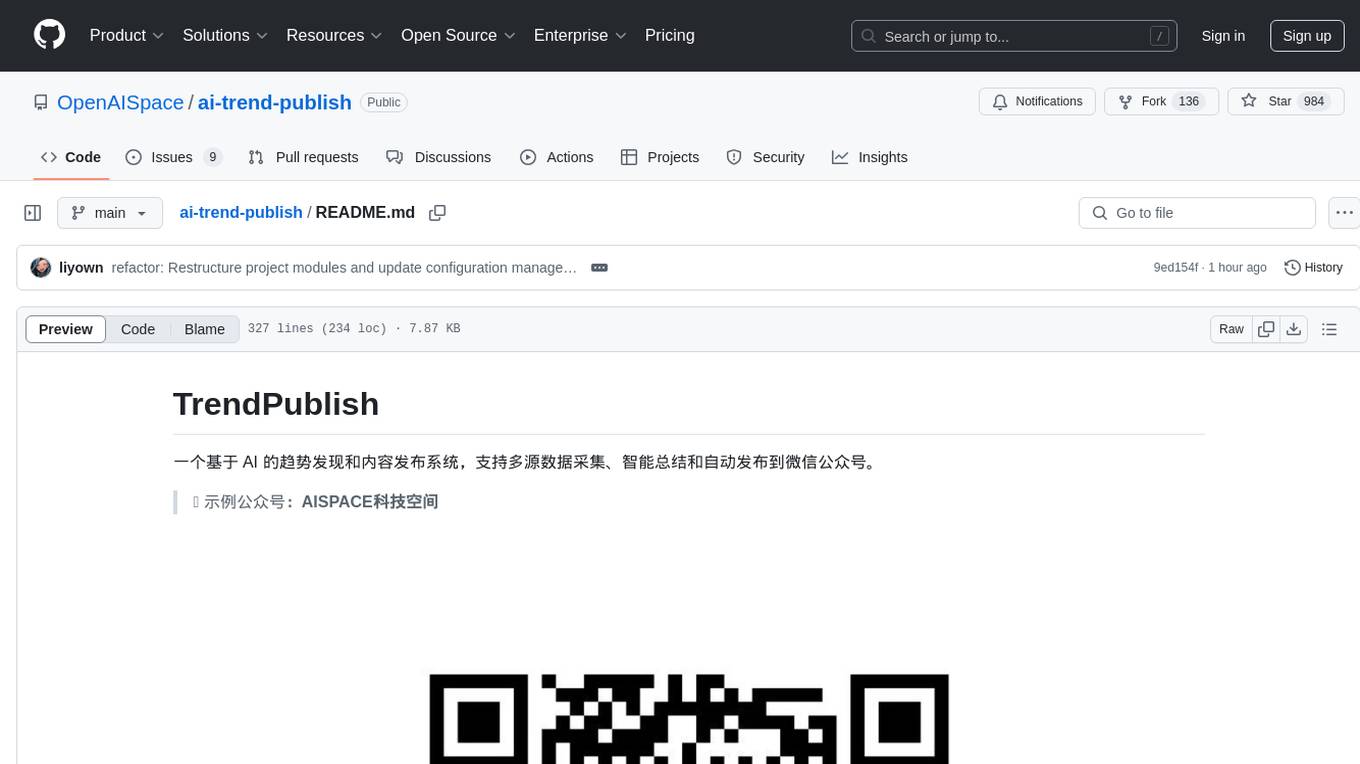
ai-trend-publish
AI TrendPublish is an AI-based trend discovery and content publishing system that supports multi-source data collection, intelligent summarization, and automatic publishing to WeChat official accounts. It features data collection from various sources, AI-powered content processing using DeepseekAI Together, key information extraction, intelligent title generation, automatic article publishing to WeChat official accounts with custom templates and scheduled tasks, notification system integration with Bark for task status updates and error alerts. The tool offers multiple templates for content customization and is built using Node.js + TypeScript with AI services from DeepseekAI Together, data sources including Twitter/X API and FireCrawl, and uses node-cron for scheduling tasks and EJS as the template engine.
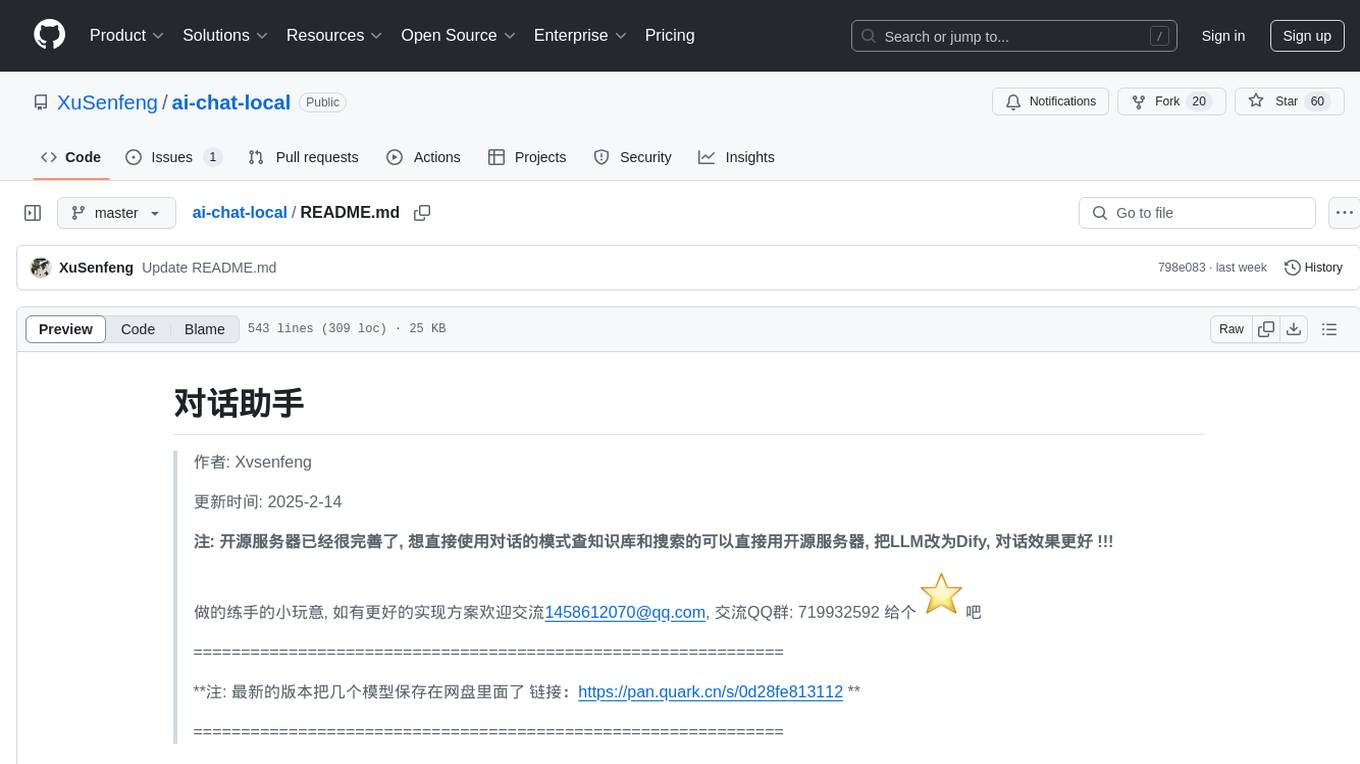
ai-chat-local
The ai-chat-local repository is a project that implements a local model customization using ollama, allowing data privacy and bypassing detection. It integrates with the esp32 development board to create a simple chat assistant. The project includes features like database integration for chat persistence, user recognition, and AI-based document processing. It also offers a graphical configuration tool for Dify.AI implementation.
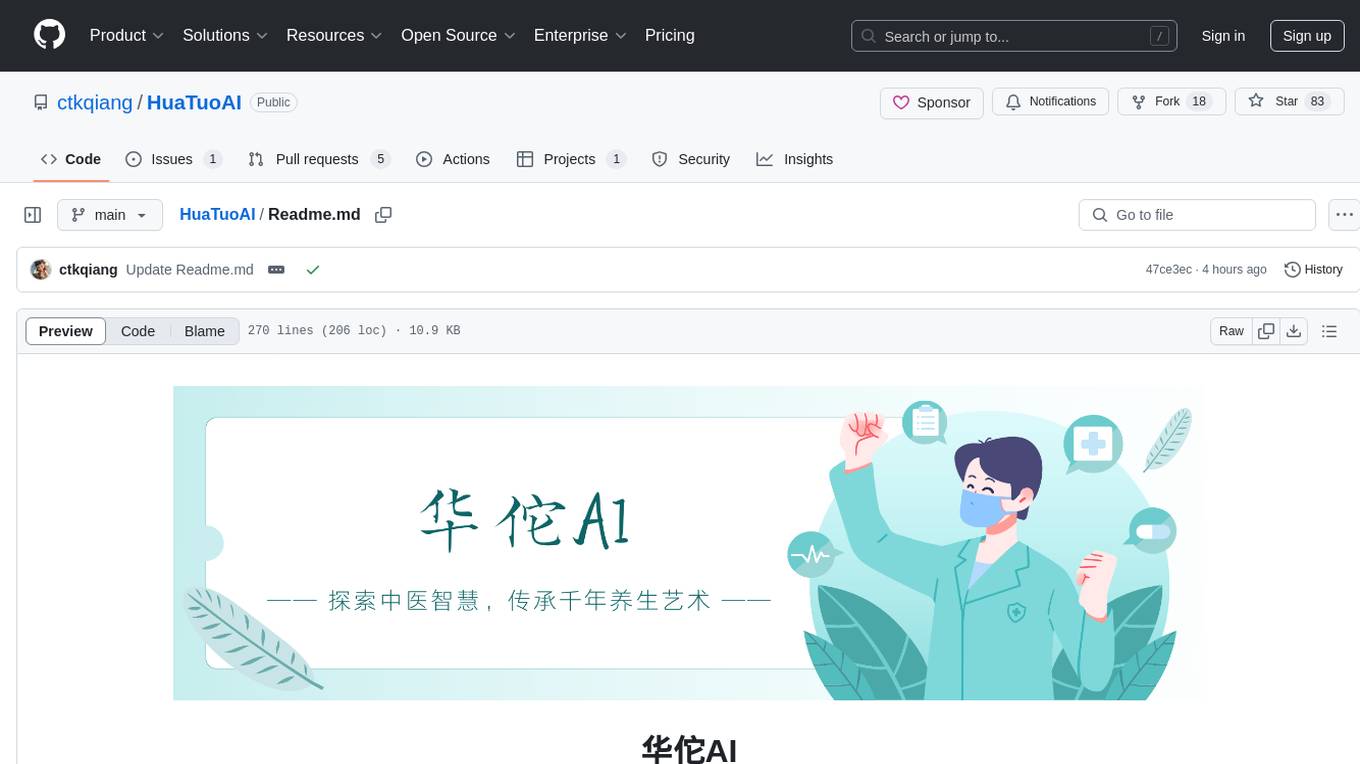
HuaTuoAI
HuaTuoAI is an artificial intelligence image classification system specifically designed for traditional Chinese medicine. It utilizes deep learning techniques, such as Convolutional Neural Networks (CNN), to accurately classify Chinese herbs and ingredients based on input images. The project aims to unlock the secrets of plants, depict the unknown realm of Chinese medicine using technology and intelligence, and perpetuate ancient cultural heritage.
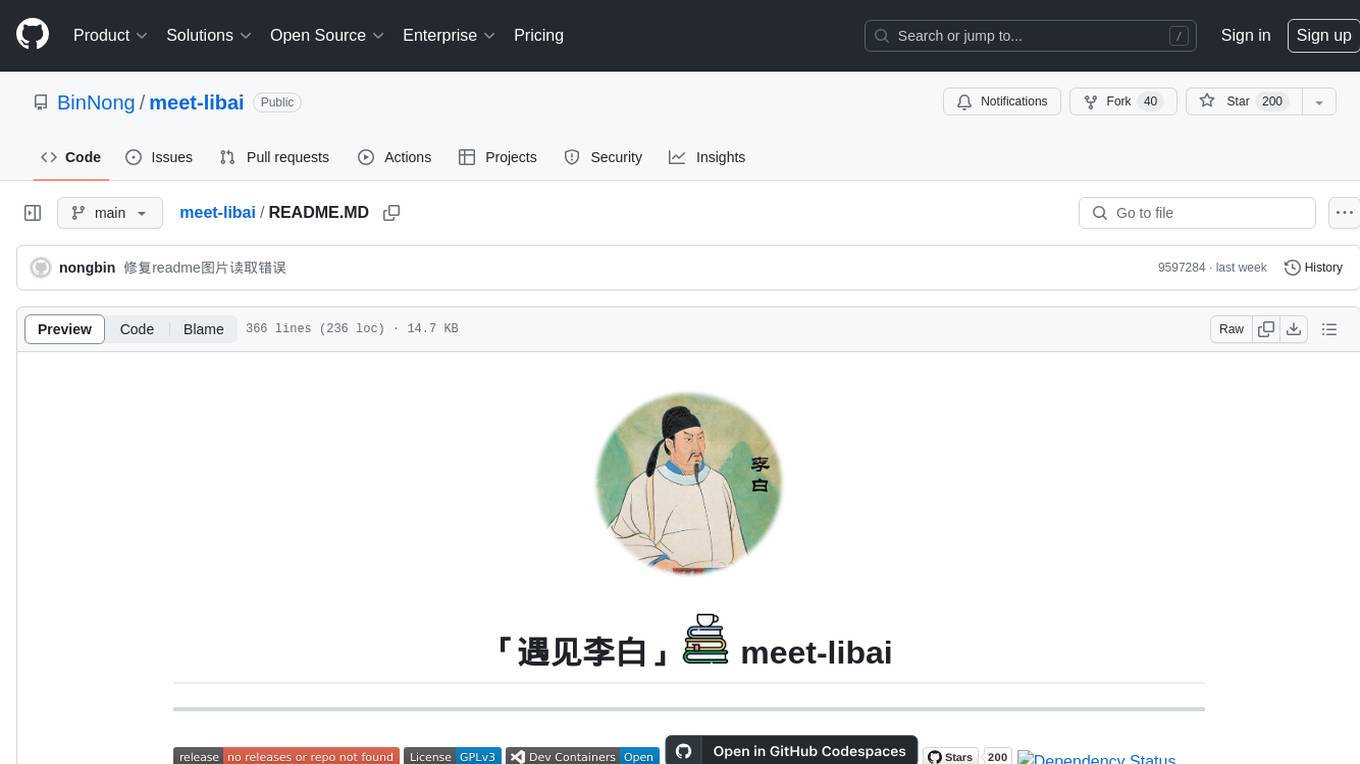
meet-libai
The 'meet-libai' project aims to promote and popularize the cultural heritage of the Chinese poet Li Bai by constructing a knowledge graph of Li Bai and training a professional AI intelligent body using large models. The project includes features such as data preprocessing, knowledge graph construction, question-answering system development, and visualization exploration of the graph structure. It also provides code implementations for large models and RAG retrieval enhancement.
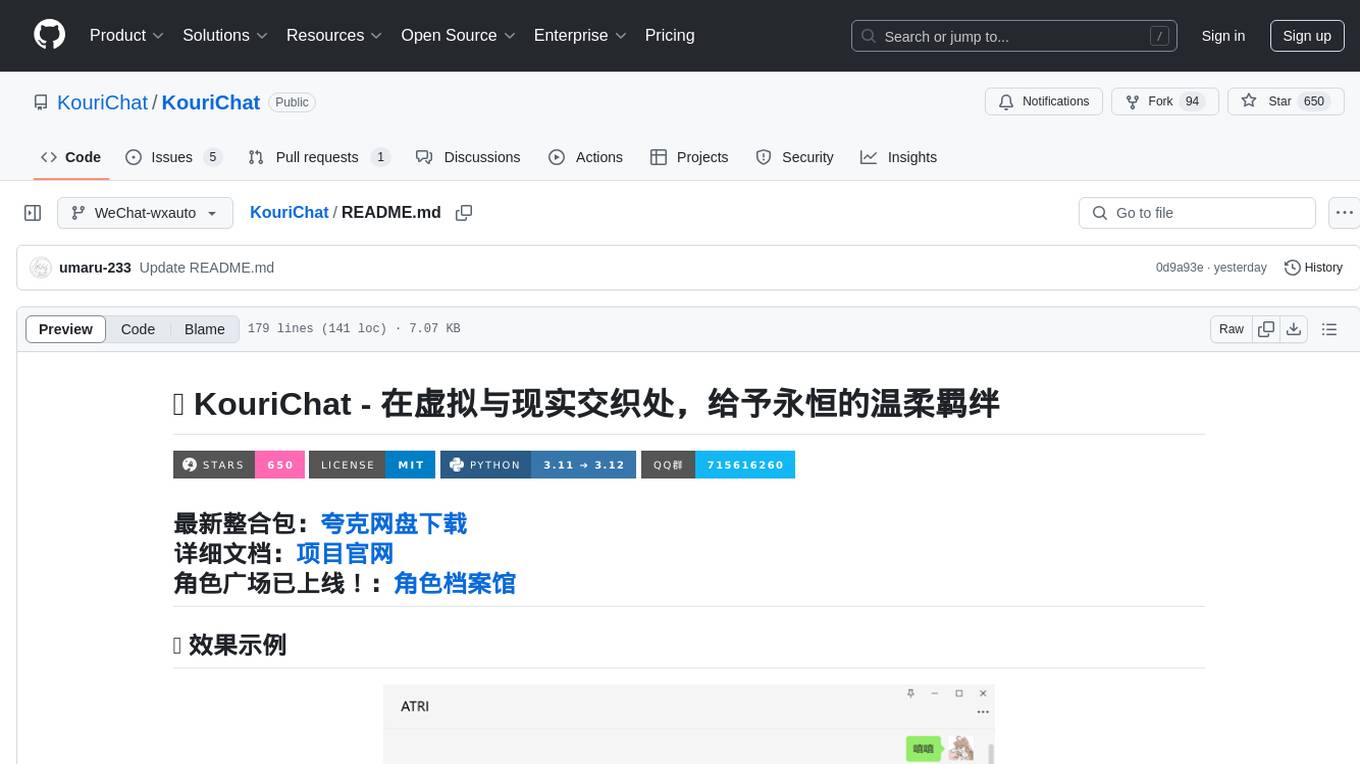
KouriChat
KouriChat is a project that seamlessly integrates virtual and real interactions, providing eternal gentle bonds. It offers features like WeChat integration, immersive role-playing, intelligent conversation segmentation, emotion-based emojis, image generation, image recognition, voice messages, and more. The project is focused on technical research and learning exchanges, with a strong emphasis on ethical and legal guidelines. Users are required to take full responsibility for their actions, especially minors who should use the tool under supervision. The project architecture includes avatar configurations, data storage, handlers, AI service interfaces, a web UI, and utility libraries.
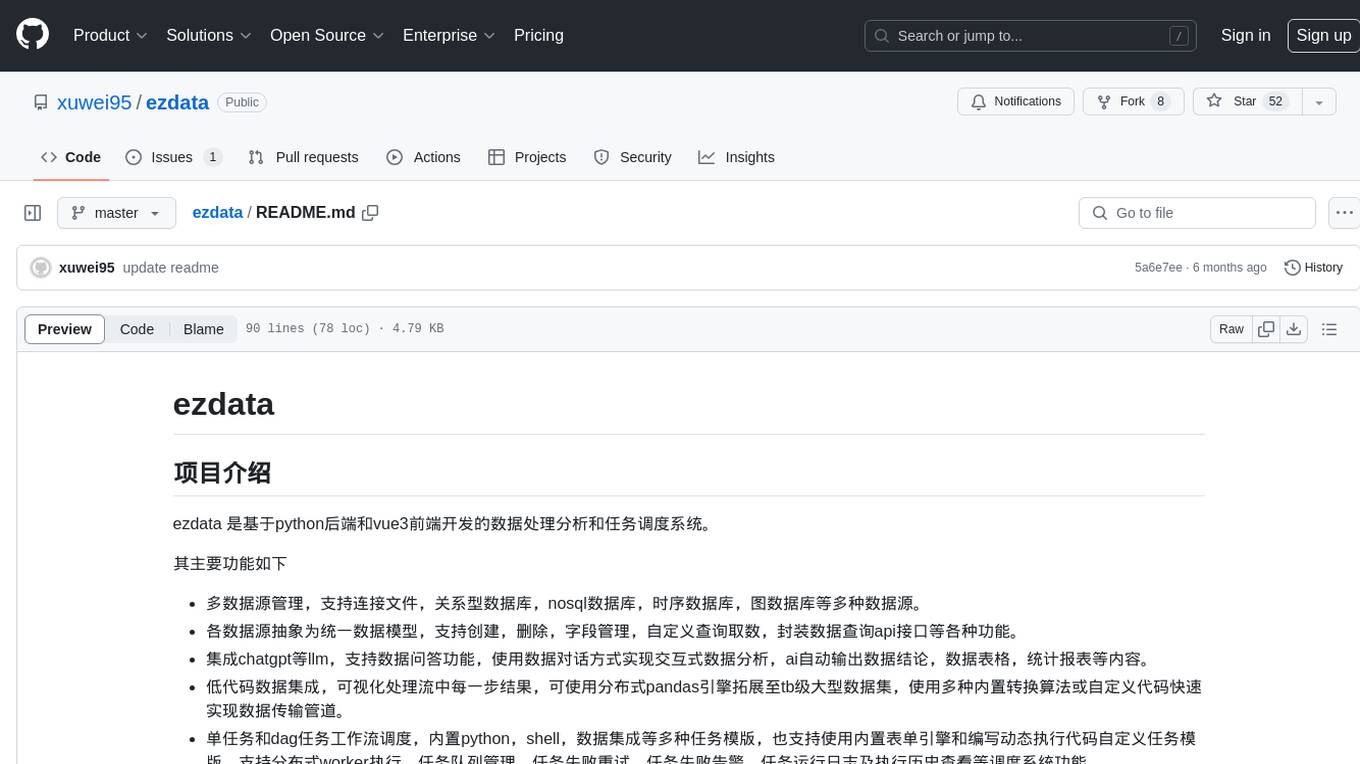
ezdata
Ezdata is a data processing and task scheduling system developed based on Python backend and Vue3 frontend. It supports managing multiple data sources, abstracting various data sources into a unified data model, integrating chatgpt for data question and answer functionality, enabling low-code data integration and visualization processing, scheduling single and dag tasks, and integrating a low-code data visualization dashboard system.
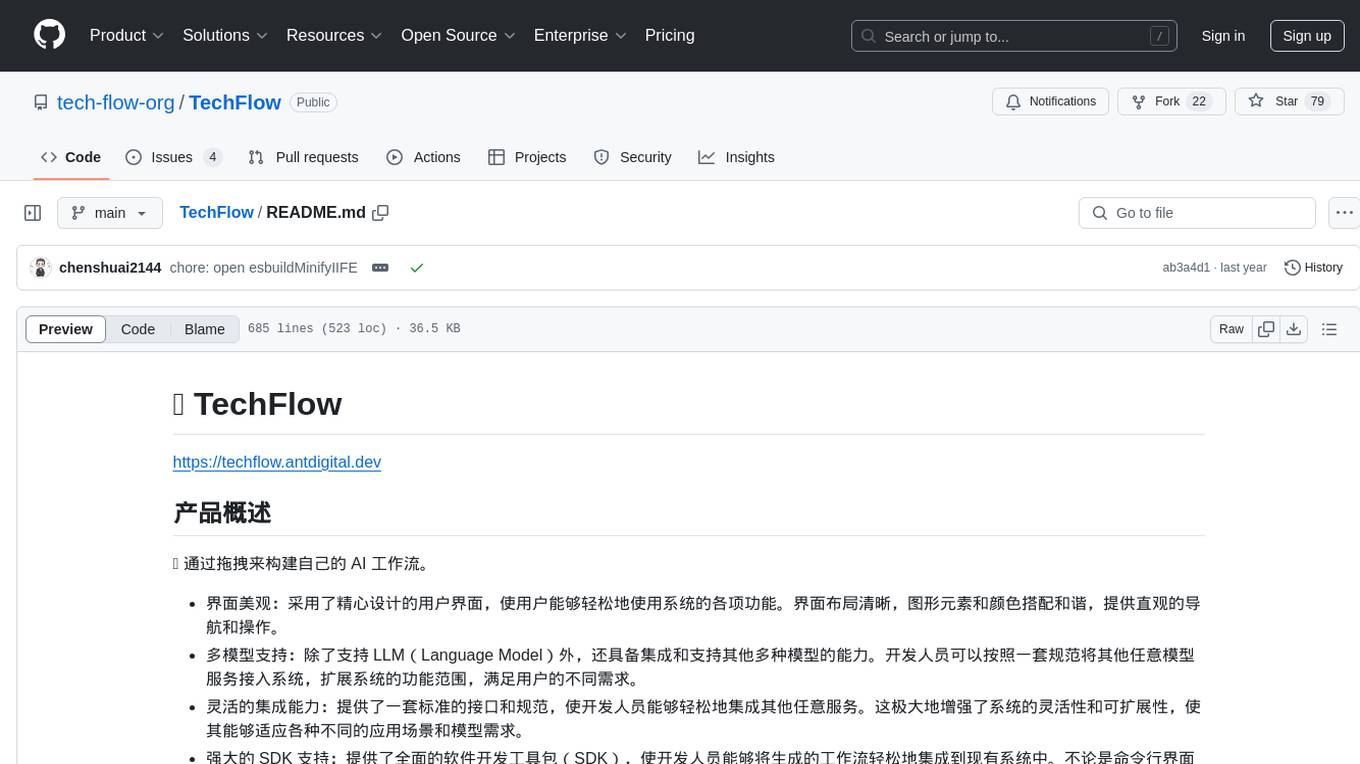
TechFlow
TechFlow is a platform that allows users to build their own AI workflows through drag-and-drop functionality. It features a visually appealing interface with clear layout and intuitive navigation. TechFlow supports multiple models beyond Language Models (LLM) and offers flexible integration capabilities. It provides a powerful SDK for developers to easily integrate generated workflows into existing systems, enhancing flexibility and scalability. The platform aims to embed AI capabilities as modules into existing functionalities to enhance business competitiveness.
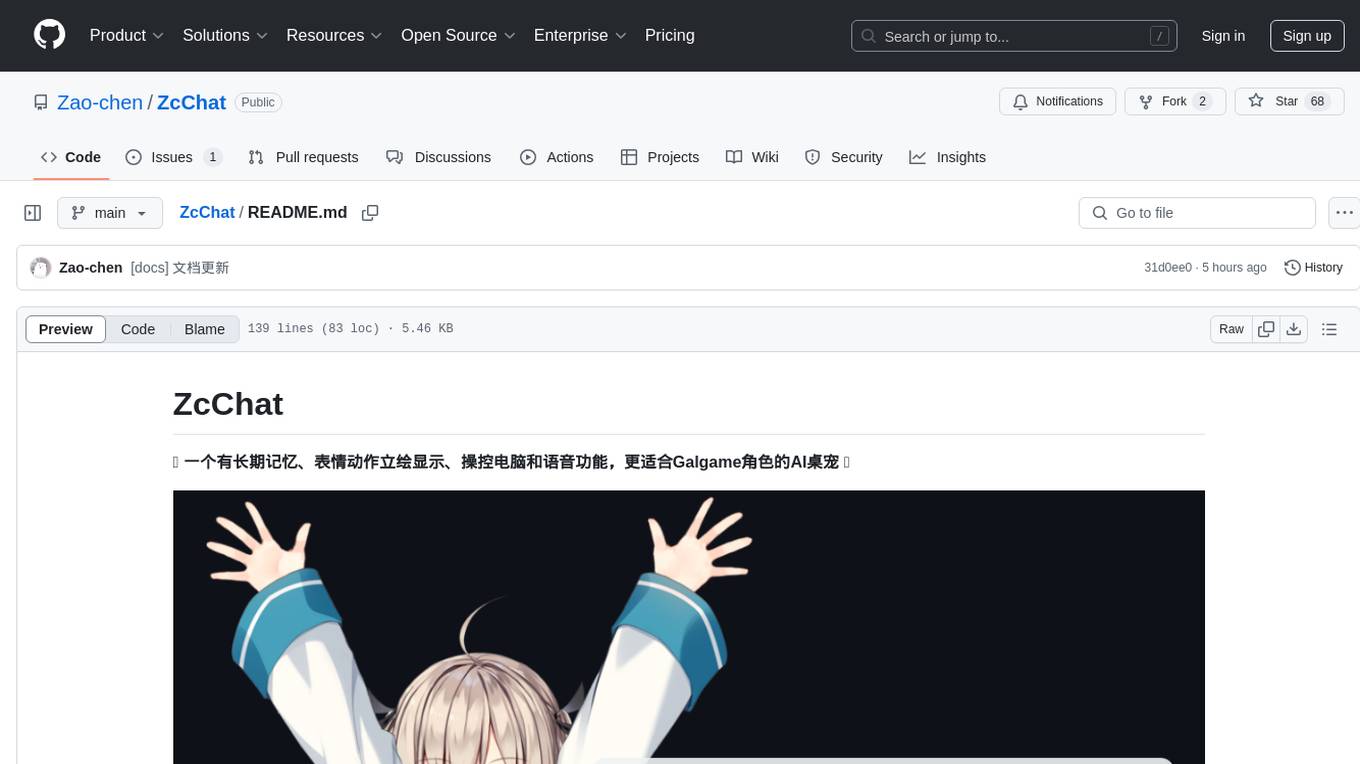
ZcChat
ZcChat is an AI desktop pet suitable for Galgame characters, featuring long-term memory, expressive actions, control over the computer, and voice functions. It utilizes Letta for AI long-term memory, Galgame-style character illustrations for more actions and expressions, and voice interaction with support for various voice synthesis tools like Vits. Users can configure characters, install Letta, set up voice synthesis and input, and control the pet to interact with the computer. The tool enhances visual and auditory experiences for users interested in AI desktop pets.
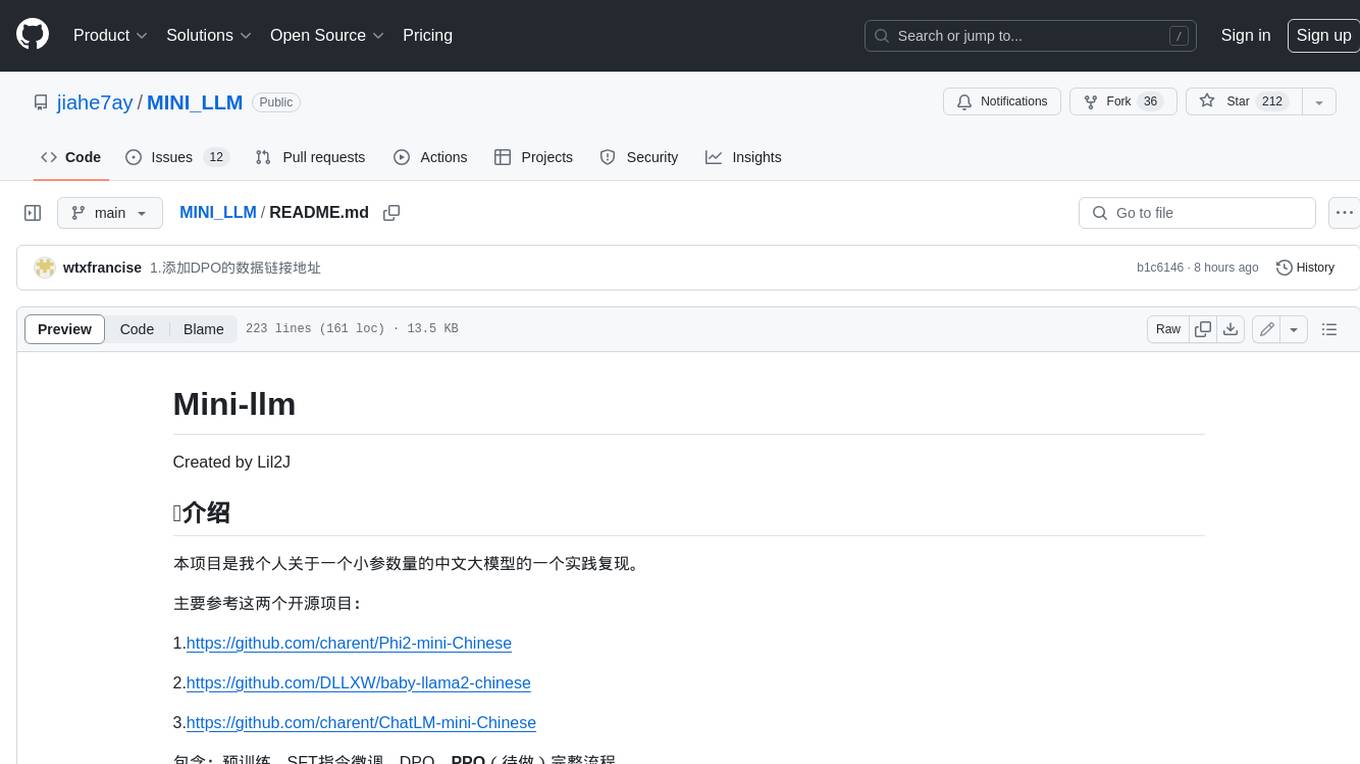
MINI_LLM
This project is a personal implementation and reproduction of a small-parameter Chinese LLM. It mainly refers to these two open source projects: https://github.com/charent/Phi2-mini-Chinese and https://github.com/DLLXW/baby-llama2-chinese. It includes the complete process of pre-training, SFT instruction fine-tuning, DPO, and PPO (to be done). I hope to share it with everyone and hope that everyone can work together to improve it!

AI-YinMei
AI-YinMei is an AI virtual anchor Vtuber development tool (N card version). It supports fastgpt knowledge base chat dialogue, a complete set of solutions for LLM large language models: [fastgpt] + [one-api] + [Xinference], supports docking bilibili live broadcast barrage reply and entering live broadcast welcome speech, supports Microsoft edge-tts speech synthesis, supports Bert-VITS2 speech synthesis, supports GPT-SoVITS speech synthesis, supports expression control Vtuber Studio, supports painting stable-diffusion-webui output OBS live broadcast room, supports painting picture pornography public-NSFW-y-distinguish, supports search and image search service duckduckgo (requires magic Internet access), supports image search service Baidu image search (no magic Internet access), supports AI reply chat box [html plug-in], supports AI singing Auto-Convert-Music, supports playlist [html plug-in], supports dancing function, supports expression video playback, supports head touching action, supports gift smashing action, supports singing automatic start dancing function, chat and singing automatic cycle swing action, supports multi scene switching, background music switching, day and night automatic switching scene, supports open singing and painting, let AI automatically judge the content.
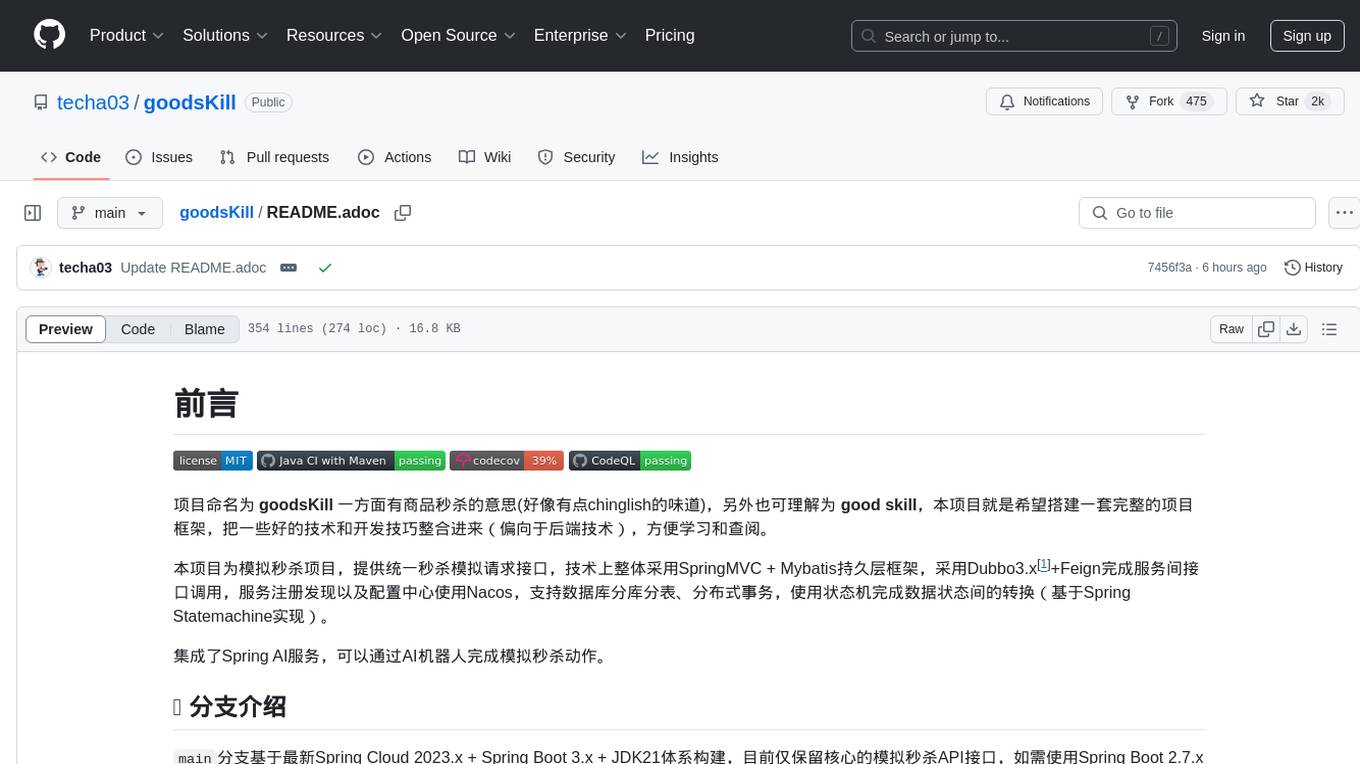
goodsKill
The 'goodsKill' project aims to build a complete project framework integrating good technologies and development techniques, mainly focusing on backend technologies. It provides a simulated flash sale project with unified flash sale simulation request interface. The project uses SpringMVC + Mybatis for the overall technology stack, Dubbo3.x for service intercommunication, Nacos for service registration and discovery, and Spring State Machine for data state transitions. It also integrates Spring AI service for simulating flash sale actions.
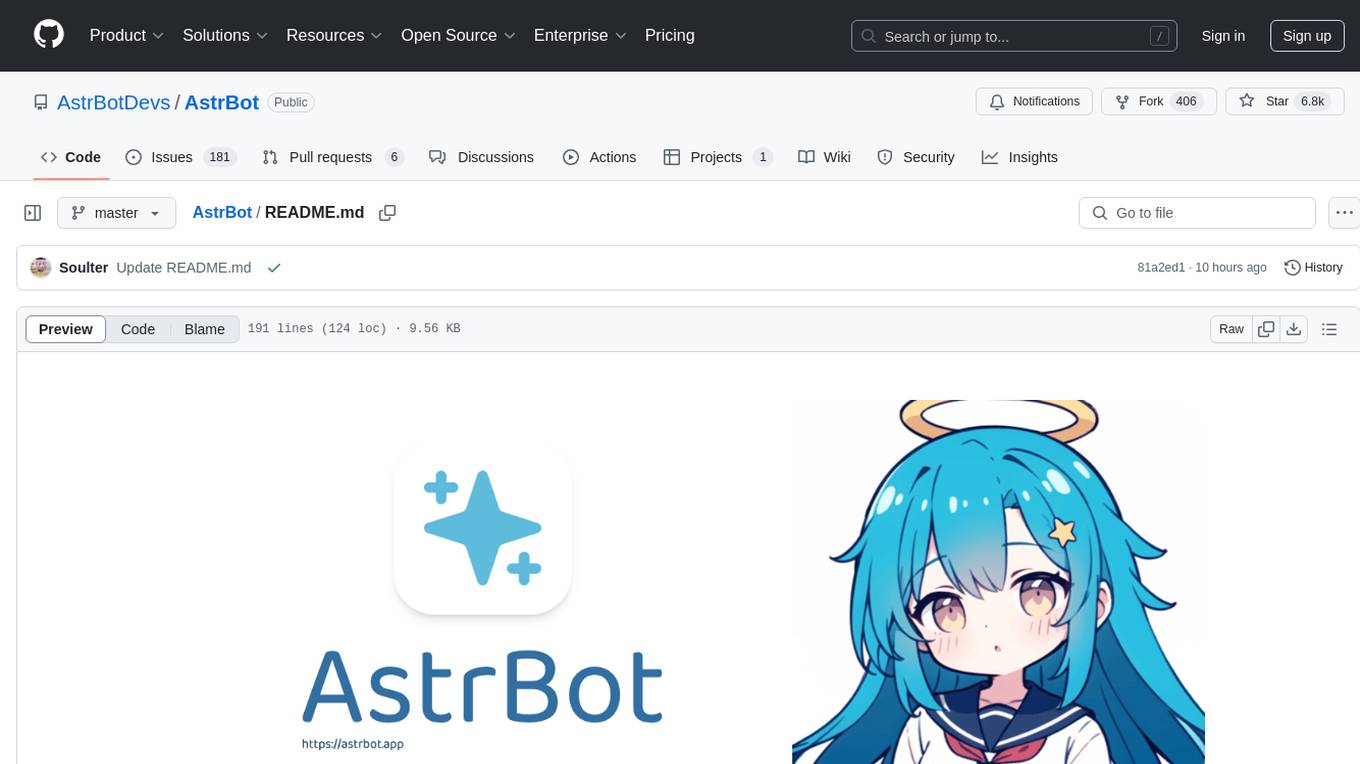
AstrBot
AstrBot is an open-source one-stop Agentic chatbot platform and development framework. It supports large model conversations, multiple messaging platforms, Agent capabilities, plugin extensions, and WebUI for visual configuration and management of the chatbot.
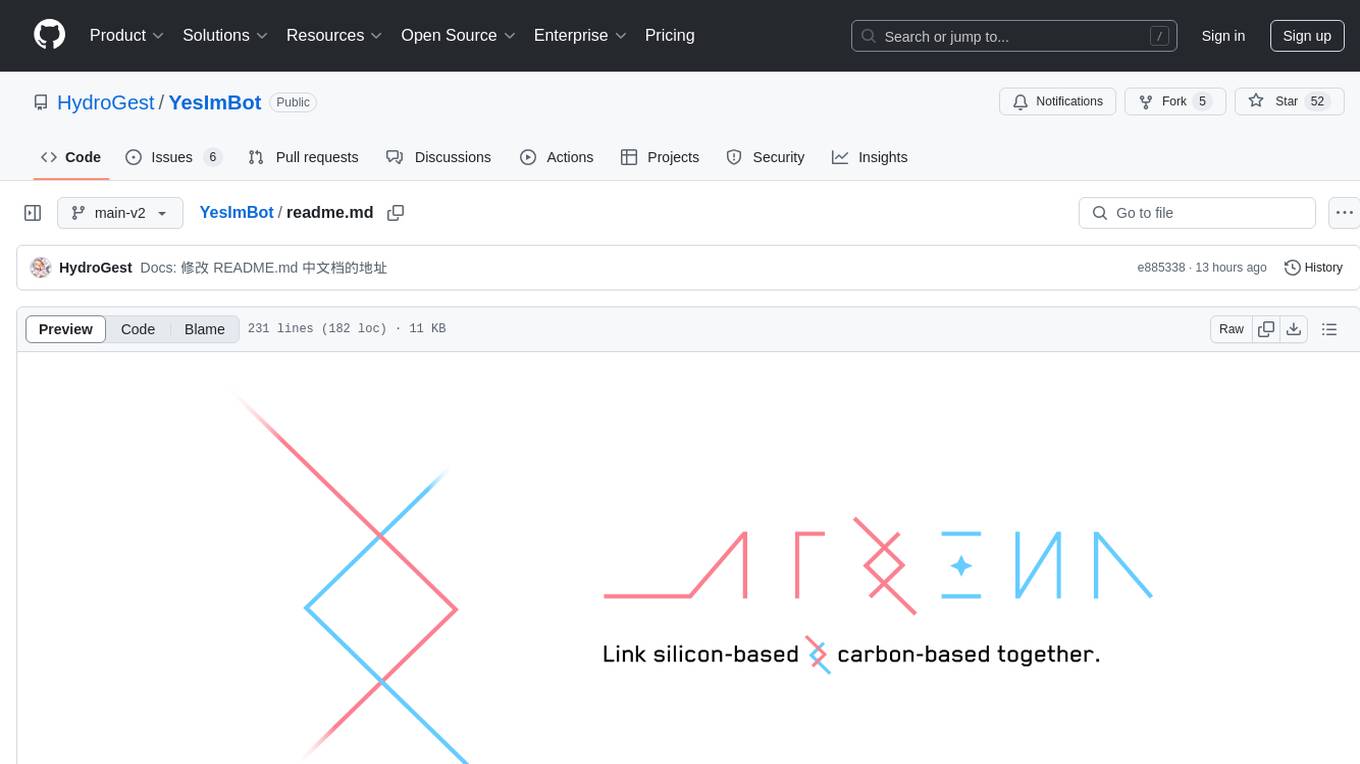
YesImBot
YesImBot, also known as Athena, is a Koishi plugin designed to allow large AI models to participate in group chat discussions. It offers easy customization of the bot's name, personality, emotions, and other messages. The plugin supports load balancing multiple API interfaces for large models, provides immersive context awareness, blocks potentially harmful messages, and automatically fetches high-quality prompts. Users can adjust various settings for the bot and customize system prompt words. The ultimate goal is to seamlessly integrate the bot into group chats without detection, with ongoing improvements and features like message recognition, emoji sending, multimodal image support, and more.
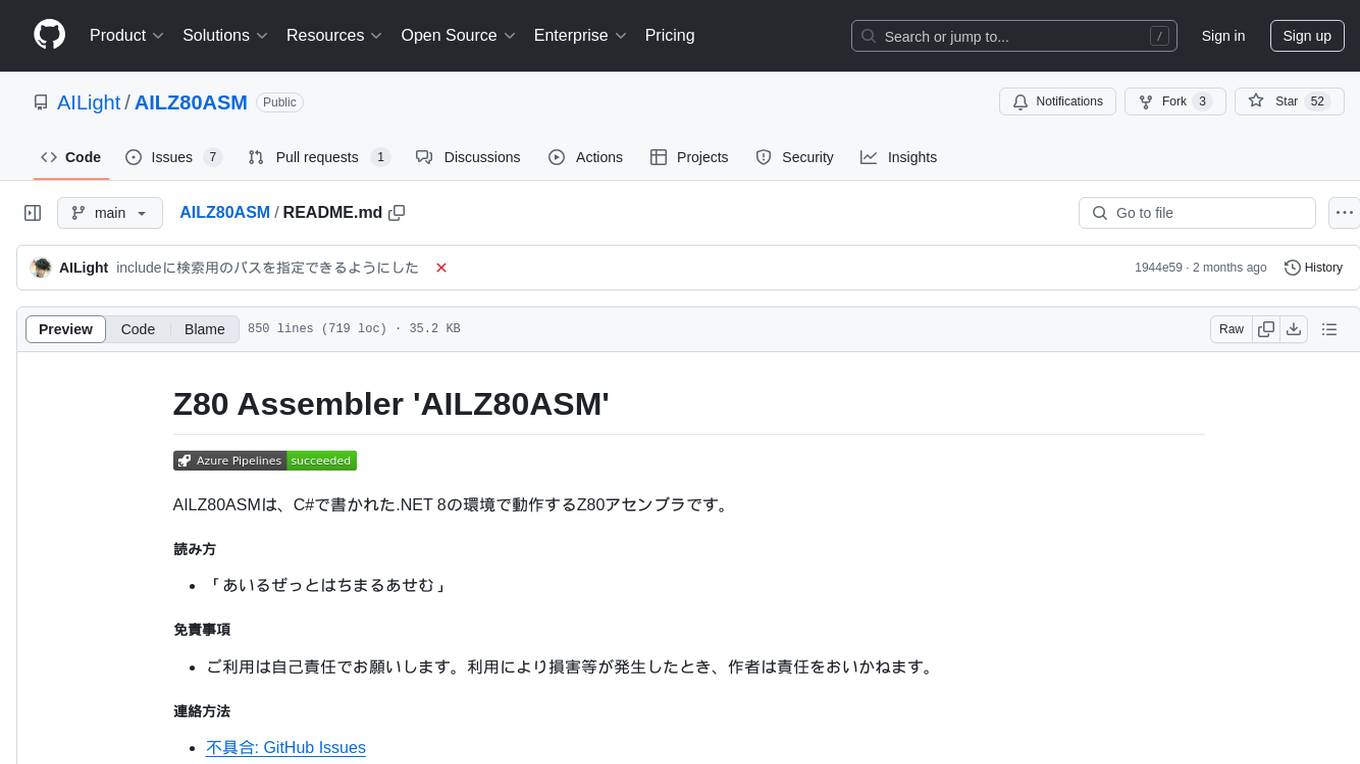
AILZ80ASM
AILZ80ASM is a Z80 assembler that runs in a .NET 8 environment written in C#. It can be used to assemble Z80 assembly code and generate output files in various formats. The tool supports various command-line options for customization and provides features like macros, conditional assembly, and error checking. AILZ80ASM offers good performance metrics with fast assembly times and efficient output file sizes. It also includes support for handling different file encodings and provides a range of built-in functions for working with labels, expressions, and data types.
For similar tasks

LLMStack
LLMStack is a no-code platform for building generative AI agents, workflows, and chatbots. It allows users to connect their own data, internal tools, and GPT-powered models without any coding experience. LLMStack can be deployed to the cloud or on-premise and can be accessed via HTTP API or triggered from Slack or Discord.

ai-guide
This guide is dedicated to Large Language Models (LLMs) that you can run on your home computer. It assumes your PC is a lower-end, non-gaming setup.

onnxruntime-genai
ONNX Runtime Generative AI is a library that provides the generative AI loop for ONNX models, including inference with ONNX Runtime, logits processing, search and sampling, and KV cache management. Users can call a high level `generate()` method, or run each iteration of the model in a loop. It supports greedy/beam search and TopP, TopK sampling to generate token sequences, has built in logits processing like repetition penalties, and allows for easy custom scoring.

jupyter-ai
Jupyter AI connects generative AI with Jupyter notebooks. It provides a user-friendly and powerful way to explore generative AI models in notebooks and improve your productivity in JupyterLab and the Jupyter Notebook. Specifically, Jupyter AI offers: * An `%%ai` magic that turns the Jupyter notebook into a reproducible generative AI playground. This works anywhere the IPython kernel runs (JupyterLab, Jupyter Notebook, Google Colab, Kaggle, VSCode, etc.). * A native chat UI in JupyterLab that enables you to work with generative AI as a conversational assistant. * Support for a wide range of generative model providers, including AI21, Anthropic, AWS, Cohere, Gemini, Hugging Face, NVIDIA, and OpenAI. * Local model support through GPT4All, enabling use of generative AI models on consumer grade machines with ease and privacy.

khoj
Khoj is an open-source, personal AI assistant that extends your capabilities by creating always-available AI agents. You can share your notes and documents to extend your digital brain, and your AI agents have access to the internet, allowing you to incorporate real-time information. Khoj is accessible on Desktop, Emacs, Obsidian, Web, and Whatsapp, and you can share PDF, markdown, org-mode, notion files, and GitHub repositories. You'll get fast, accurate semantic search on top of your docs, and your agents can create deeply personal images and understand your speech. Khoj is self-hostable and always will be.

langchain_dart
LangChain.dart is a Dart port of the popular LangChain Python framework created by Harrison Chase. LangChain provides a set of ready-to-use components for working with language models and a standard interface for chaining them together to formulate more advanced use cases (e.g. chatbots, Q&A with RAG, agents, summarization, extraction, etc.). The components can be grouped into a few core modules: * **Model I/O:** LangChain offers a unified API for interacting with various LLM providers (e.g. OpenAI, Google, Mistral, Ollama, etc.), allowing developers to switch between them with ease. Additionally, it provides tools for managing model inputs (prompt templates and example selectors) and parsing the resulting model outputs (output parsers). * **Retrieval:** assists in loading user data (via document loaders), transforming it (with text splitters), extracting its meaning (using embedding models), storing (in vector stores) and retrieving it (through retrievers) so that it can be used to ground the model's responses (i.e. Retrieval-Augmented Generation or RAG). * **Agents:** "bots" that leverage LLMs to make informed decisions about which available tools (such as web search, calculators, database lookup, etc.) to use to accomplish the designated task. The different components can be composed together using the LangChain Expression Language (LCEL).

danswer
Danswer is an open-source Gen-AI Chat and Unified Search tool that connects to your company's docs, apps, and people. It provides a Chat interface and plugs into any LLM of your choice. Danswer can be deployed anywhere and for any scale - on a laptop, on-premise, or to cloud. Since you own the deployment, your user data and chats are fully in your own control. Danswer is MIT licensed and designed to be modular and easily extensible. The system also comes fully ready for production usage with user authentication, role management (admin/basic users), chat persistence, and a UI for configuring Personas (AI Assistants) and their Prompts. Danswer also serves as a Unified Search across all common workplace tools such as Slack, Google Drive, Confluence, etc. By combining LLMs and team specific knowledge, Danswer becomes a subject matter expert for the team. Imagine ChatGPT if it had access to your team's unique knowledge! It enables questions such as "A customer wants feature X, is this already supported?" or "Where's the pull request for feature Y?"

infinity
Infinity is an AI-native database designed for LLM applications, providing incredibly fast full-text and vector search capabilities. It supports a wide range of data types, including vectors, full-text, and structured data, and offers a fused search feature that combines multiple embeddings and full text. Infinity is easy to use, with an intuitive Python API and a single-binary architecture that simplifies deployment. It achieves high performance, with 0.1 milliseconds query latency on million-scale vector datasets and up to 15K QPS.
For similar jobs

weave
Weave is a toolkit for developing Generative AI applications, built by Weights & Biases. With Weave, you can log and debug language model inputs, outputs, and traces; build rigorous, apples-to-apples evaluations for language model use cases; and organize all the information generated across the LLM workflow, from experimentation to evaluations to production. Weave aims to bring rigor, best-practices, and composability to the inherently experimental process of developing Generative AI software, without introducing cognitive overhead.

LLMStack
LLMStack is a no-code platform for building generative AI agents, workflows, and chatbots. It allows users to connect their own data, internal tools, and GPT-powered models without any coding experience. LLMStack can be deployed to the cloud or on-premise and can be accessed via HTTP API or triggered from Slack or Discord.

VisionCraft
The VisionCraft API is a free API for using over 100 different AI models. From images to sound.

kaito
Kaito is an operator that automates the AI/ML inference model deployment in a Kubernetes cluster. It manages large model files using container images, avoids tuning deployment parameters to fit GPU hardware by providing preset configurations, auto-provisions GPU nodes based on model requirements, and hosts large model images in the public Microsoft Container Registry (MCR) if the license allows. Using Kaito, the workflow of onboarding large AI inference models in Kubernetes is largely simplified.

PyRIT
PyRIT is an open access automation framework designed to empower security professionals and ML engineers to red team foundation models and their applications. It automates AI Red Teaming tasks to allow operators to focus on more complicated and time-consuming tasks and can also identify security harms such as misuse (e.g., malware generation, jailbreaking), and privacy harms (e.g., identity theft). The goal is to allow researchers to have a baseline of how well their model and entire inference pipeline is doing against different harm categories and to be able to compare that baseline to future iterations of their model. This allows them to have empirical data on how well their model is doing today, and detect any degradation of performance based on future improvements.

tabby
Tabby is a self-hosted AI coding assistant, offering an open-source and on-premises alternative to GitHub Copilot. It boasts several key features: * Self-contained, with no need for a DBMS or cloud service. * OpenAPI interface, easy to integrate with existing infrastructure (e.g Cloud IDE). * Supports consumer-grade GPUs.

spear
SPEAR (Simulator for Photorealistic Embodied AI Research) is a powerful tool for training embodied agents. It features 300 unique virtual indoor environments with 2,566 unique rooms and 17,234 unique objects that can be manipulated individually. Each environment is designed by a professional artist and features detailed geometry, photorealistic materials, and a unique floor plan and object layout. SPEAR is implemented as Unreal Engine assets and provides an OpenAI Gym interface for interacting with the environments via Python.

Magick
Magick is a groundbreaking visual AIDE (Artificial Intelligence Development Environment) for no-code data pipelines and multimodal agents. Magick can connect to other services and comes with nodes and templates well-suited for intelligent agents, chatbots, complex reasoning systems and realistic characters.
